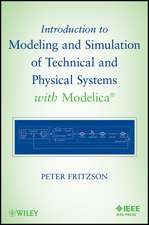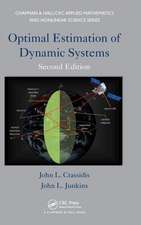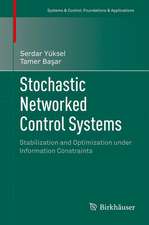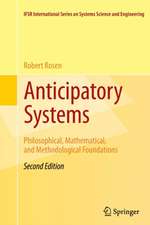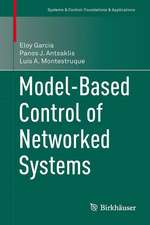Towards a Post-Bertalanffy Systemics: Contemporary Systems Thinking
Editat de Gianfranco Minati, Mario Abram, Eliano Pessaen Limba Engleză Hardback – 6 ian 2016
The conference was devoted to identifying, discussing and understanding possible interrelationships of theoretical disciplinary improvements, recognized as having prospective fundamental roles for a new post-Bertalanffy Systemics. The latter should be able to deal with problems related to complexity in a generalized way. In this context the inter-disciplinarity should consists, for instance, in a disciplinary reformulation of problems, as from algebraic to geometrical, from military to political, from biological to chemical, while the trans-disciplinarity should be related to the study of such reformulations and their properties.
The Italian Systems Society (AIRS) was founded in the 1996. The AIRS is a network of academicians, scientists, researchers and professionals involved in Systemics. A partial list of disciplines represented is:
Architecture
Biology
Economics
Education
Engineering
Mathematics
Neurosciences
Medicine
Music
Philosophy
Psychology
Physics.
Previous conferences had as open lecturers professors Arecchi, Haken, Klir, and Kauffman. The proceedings have been published as:
1. Minati, G., (ed.), (1998), Proceedings of the first Italian Conference on Systemics, Apogeo Scientifica, Milan, Italy.
2. Minati, G., and Pessa, E., (eds.) (2002), Emergence in Complex Cognitive, Social and Biological Systems. Kluwer, New York.
3. Minati, G., Pessa, E., and Abram, M., (eds.), (2006), Systemics of Emergence: Research and Applications. Springer, New York.
4. Minati, G., Abram, M. and Pessa, E., (eds.), (2009), Processes of emergence of systems and systemic properties. Towards a generaltheory of emergence. World Scientific, Singapore.
5. Minati, G., Abram, M. and Pessa, E., (eds.), (2012), Methods, Models, simulations and approaches - towards a general theory of change. World Scientific, Singapore.
| Toate formatele și edițiile | Preț | Express |
|---|---|---|
| Paperback (1) | 639.90 lei 43-57 zile | |
| Springer International Publishing – 30 mar 2018 | 639.90 lei 43-57 zile | |
| Hardback (1) | 646.11 lei 43-57 zile | |
| Springer International Publishing – 6 ian 2016 | 646.11 lei 43-57 zile |
Din seria Contemporary Systems Thinking
- 18%
 Preț: 966.27 lei
Preț: 966.27 lei - 15%
 Preț: 646.75 lei
Preț: 646.75 lei - 15%
 Preț: 643.34 lei
Preț: 643.34 lei - 15%
 Preț: 644.63 lei
Preț: 644.63 lei - 15%
 Preț: 657.25 lei
Preț: 657.25 lei - 18%
 Preț: 1219.94 lei
Preț: 1219.94 lei - 18%
 Preț: 950.21 lei
Preț: 950.21 lei - 18%
 Preț: 959.67 lei
Preț: 959.67 lei - 15%
 Preț: 672.95 lei
Preț: 672.95 lei - 18%
 Preț: 950.66 lei
Preț: 950.66 lei - 18%
 Preț: 981.61 lei
Preț: 981.61 lei - 18%
 Preț: 1119.56 lei
Preț: 1119.56 lei - 18%
 Preț: 1565.61 lei
Preț: 1565.61 lei - 18%
 Preț: 905.68 lei
Preț: 905.68 lei - 18%
 Preț: 948.47 lei
Preț: 948.47 lei - 18%
 Preț: 894.16 lei
Preț: 894.16 lei - 18%
 Preț: 1020.60 lei
Preț: 1020.60 lei - 18%
 Preț: 1226.42 lei
Preț: 1226.42 lei - 18%
 Preț: 950.84 lei
Preț: 950.84 lei - 15%
 Preț: 705.83 lei
Preț: 705.83 lei - 18%
 Preț: 953.03 lei
Preț: 953.03 lei -
 Preț: 390.08 lei
Preț: 390.08 lei - 18%
 Preț: 891.80 lei
Preț: 891.80 lei - 15%
 Preț: 647.08 lei
Preț: 647.08 lei - 18%
 Preț: 949.42 lei
Preț: 949.42 lei - 15%
 Preț: 653.14 lei
Preț: 653.14 lei -
 Preț: 381.21 lei
Preț: 381.21 lei - 15%
 Preț: 652.17 lei
Preț: 652.17 lei - 18%
 Preț: 960.61 lei
Preț: 960.61 lei - 15%
 Preț: 649.54 lei
Preț: 649.54 lei - 18%
 Preț: 733.96 lei
Preț: 733.96 lei -
 Preț: 392.21 lei
Preț: 392.21 lei - 18%
 Preț: 957.44 lei
Preț: 957.44 lei - 15%
 Preț: 649.06 lei
Preț: 649.06 lei
Preț: 646.11 lei
Preț vechi: 760.13 lei
-15% Nou
Puncte Express: 969
Preț estimativ în valută:
123.63€ • 129.41$ • 102.90£
123.63€ • 129.41$ • 102.90£
Carte tipărită la comandă
Livrare economică 31 martie-14 aprilie
Preluare comenzi: 021 569.72.76
Specificații
ISBN-13: 9783319243894
ISBN-10: 3319243896
Pagini: 256
Ilustrații: XXVII, 256 p. 62 illus., 32 illus. in color.
Dimensiuni: 155 x 235 x 18 mm
Greutate: 0.58 kg
Ediția:1st ed. 2016
Editura: Springer International Publishing
Colecția Springer
Seria Contemporary Systems Thinking
Locul publicării:Cham, Switzerland
ISBN-10: 3319243896
Pagini: 256
Ilustrații: XXVII, 256 p. 62 illus., 32 illus. in color.
Dimensiuni: 155 x 235 x 18 mm
Greutate: 0.58 kg
Ediția:1st ed. 2016
Editura: Springer International Publishing
Colecția Springer
Seria Contemporary Systems Thinking
Locul publicării:Cham, Switzerland
Public țintă
ResearchCuprins
Quantum Effects in Linguistic Endeavors.- Cross-Frequency Modulation, Network Information Integration and Cognitive Performance in Complex Systems.- Testing Different Learning Strategies on a Simple Connectionist Model of Numerical Fact Retrieval.- Dynamical Systems and Automata.- Towards the Study of New Nuclear Energies.- Decomposing Dynamical Systems.- For a Topology of Dynamical Systems.- EPAS: Artificial Intelligent System for Assistance.- From Systemic Complexity to Systemic Simplicity: A New Networking Node Approach.- Formal Concept Analysis in Statistical Hypothesis Testing.- Emergence in Neural Netwok Models of Cognitive Processing.- Beyond Networks: Search for Relevant Subsets in Complex Systems.- From Elementary Pragmatic Model (EPM) to Evolutive Elementary Pragmatic Model (E2PM).- Systemic Approach and Meaningful Complexity in Biology.- Changing Framework in Explaining Complex Dynamics: Convergences on Systemic Accounts From Two Different Case Studies.- Perceptions of Landscape. Observed and Observing Systems.- Thinking Smart City with a Focus on Emerging Identity Elements.- Architecture and Systemics. In Praise of Roughness.- Emergences in Social Systems. Perceptual Factors, Affordances and Performances in Architecture.- Bank of Experiences. A Tool to Enhance Creativity, Enterprises and Countries.- ;Systems and Organizations. Theoretical Tools, Conceptual Distinctions and Epistemological Implications.- General System(s) Theory 2.0: A Brief Outline.- Phenomenology of Emergence in Music. Presentation of the Processes of Systemic Emergence in the Contrapuntal and Improvizational Aspects of Baroque Music.- Fractal Self-Similarity. From Geometric Structures to Dynamical Coherent Dynamics.- Enhancement in Mathematical Abilities: A System Approach.- The Effect of Written Approval on Pupils’ Academic and Social Behavior: An Exploratory Study in a Northern Italian Middle School.
Notă biografică
Gianfranco Minati, Mathematician, Founder and president of the Italian Systems Society (AIRS); Doctoral lecturer at the Polytechnic of Milan; Member of the scientific committee of Conferences and Systems Societies. He is author of 32 chapters in books; editor of 7 books and journals; author or co-author of 15 books; author of 30 articles and of academic publications. His current research interest focuses on 1) Modelling processes of emergence by using Meta-Structures; 2) the emerging of a post-Bertalanffy Systemics; 3) the Dynamic Usage of Models (DYSAM), Logical Openness; 4) Architecture and Design as the design of social meta-structures to influence processes of emergence in social systems.
Mario R. Abram, Physicist, is an active member of the Italian Systems Society (AIRS). He worked mainly in ENEL (Italian Power Agency), at Research Department (Automatica Research Center), then in Cesi S.p.A. and Cesi Ricerca S.p.A. He experienced hybrid and digitalsimulation systems, working on models of power systems, thermoelectric and nuclear power plants and processes control. He participated in the building of real-time simulators for thermoelectric power plants and their application to control systems testing and tuning, in the development of supervision and control systems for power testing facilities and distribution networks. Also he worked on the application of neural networks to power systems supervision and investigated safety conditions in interactions between infrastructures. He authored several publications in systems science. His research interests include: dynamical systems, modelling and simulation of processes and interactions between infrastructural networks.
Eliano Pessa, Theoretical Physicist, is actually Full Professor of General Psychology and Cognitive Modeling at the University of Pavia, Italy. He has already been Dean of the Department of Psychology and of the Inter-departmental Research Center on Cognitive Science in the same university. In the past he has been Associate Professor of Artificial Intelligence at the University of Rome “La Sapienza”, Faculty of Psychology. He is author or co-author of 10 books and of a large number of papers on scientific journals, books, proceedings of international conferences. His scientific research interests include: quantum theories of brain operation, computational neuroscience, artificial neural networks, models of emergence processes, quantum field theory, models of phase transitions in condensed matter, models of human memory and visual perception, models of decision making, models of statistical reasoning.
Mario R. Abram, Physicist, is an active member of the Italian Systems Society (AIRS). He worked mainly in ENEL (Italian Power Agency), at Research Department (Automatica Research Center), then in Cesi S.p.A. and Cesi Ricerca S.p.A. He experienced hybrid and digitalsimulation systems, working on models of power systems, thermoelectric and nuclear power plants and processes control. He participated in the building of real-time simulators for thermoelectric power plants and their application to control systems testing and tuning, in the development of supervision and control systems for power testing facilities and distribution networks. Also he worked on the application of neural networks to power systems supervision and investigated safety conditions in interactions between infrastructures. He authored several publications in systems science. His research interests include: dynamical systems, modelling and simulation of processes and interactions between infrastructural networks.
Eliano Pessa, Theoretical Physicist, is actually Full Professor of General Psychology and Cognitive Modeling at the University of Pavia, Italy. He has already been Dean of the Department of Psychology and of the Inter-departmental Research Center on Cognitive Science in the same university. In the past he has been Associate Professor of Artificial Intelligence at the University of Rome “La Sapienza”, Faculty of Psychology. He is author or co-author of 10 books and of a large number of papers on scientific journals, books, proceedings of international conferences. His scientific research interests include: quantum theories of brain operation, computational neuroscience, artificial neural networks, models of emergence processes, quantum field theory, models of phase transitions in condensed matter, models of human memory and visual perception, models of decision making, models of statistical reasoning.
Textul de pe ultima copertă
This book contains the proceedings of the Sixth National Conference of the Italian Systems Society. The title, Towards a post-Bertalanffy Systemics, aims to underline the need for Systemics and Systems Science to generalize theoretically concepts related to complexity (the great enemy of Bertalanffy Systemics). Hopefully this goal should be achieved by working in an inter-disciplinary and trans-disciplinary fashion, using systemic concepts arising from various disciplines and from the original, or Bertalanffy Systemics, as well. The interdisciplinary nature of the original Systemics and its power of generalization were given, overall, by the fact that the problems and solutions of one discipline become problems and solutions for another. Today, the modeling and interpretation of multidisciplinary approaches and representations makes easier to recognize these interconnections. The context, however, has changed dramatically. Of course, the challenge is still to find theoretical generalizations and applications, even where we have a lot of specificities, but we know very little on how to combine them. We cannot, however, simply replace the old with the new, but we must introduce strategies to recognize, represent, model and act on new levels, combining multiple representations, functions and emergence. In many disciplines this has been already done, and inevitably well, since targets and projects are well specified and oriented. The challenge is to do it for Systemics, with the vocations of cultural and theoretical generalization. Examples of new issues introduced by such theoretical disciplinary improvements, dealt with by many disciplines, include the study of mesoscopic or middle-way level, of multiple and dynamic coherence, of equivalence/non-equivalence, of fractality, of networks, of non-causality, of non-invasiveness, of non-prescribability, of non-separability, of quasi properties, of symmetry properties, of topological dynamics, as well as of quantum theoriesand concepts.
The conference was devoted to identifying, discussing and understanding possible interrelationships of theoretical disciplinary improvements, recognized as having prospective fundamental roles for a new post-Bertalanffy Systemics. The latter should be able to deal with problems related to complexity in a generalized way. In this context the inter-disciplinarity should consists, for instance, in a disciplinary reformulation of problems, as from algebraic to geometrical, from military to political, from biological to chemical, while the trans-disciplinarity should be related to the study of such reformulations and their properties.
Caracteristici
Presents outstanding contributions from the Italian Systems Society’s Sixth National Conference on Systems Science Identifies and discusses possible interrelations of theoretical disciplinary improvements recognized as having perspective founding roles for a new post-Bertalanffy Systemics able to deal with problems of complexity in a generalized way when inter-disciplinarity consists Editors are established and well respected in the field of systems sciences Includes supplementary material: sn.pub/extras




